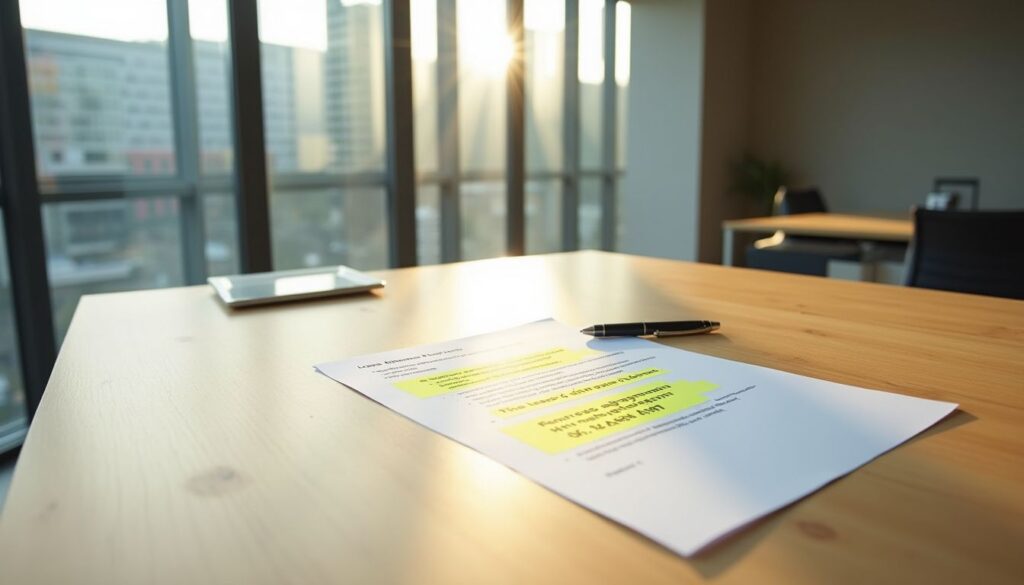
Struggling with fair lease renewals in Ontario? Renewal clauses can heavily impact business costs and operations. This guide explains “Renewal Clauses In Ontario Leases: How To Negotiate Fair Terms.” Learn how to protect your rights and secure better terms.
Table of Contents
ToggleKey Takeaways
- Start lease renewal talks 18-24 months before the lease ends for better results. Notify landlords in writing before expiration to avoid losing rights.
- Fair rent terms matter. Use fixed increases, market value, or CPI-based methods with caps on hikes to protect tenants from sudden rent changes.
- Clear clauses prevent problems. Define repair duties, notice periods, and tenant improvement rules to avoid disputes and surprises later.
- Flexibility is key for growth or downsizing needs. Negotiate shorter renewal options and include expansion or contraction rights in agreements.
- Work with professional experts like Hadri Law for clear contracts, fair renewals, and compliance with Ontario laws.
Renewal Clauses In Ontario Leases: How To Negotiate Fair Terms

Renewal clauses can protect your business and offer stability for the future. Clear, fair terms help avoid disputes and ensure a balanced agreement.
Defining renewal and extension clauses
An option to renew creates a new lease after the current one ends. An extension continues the same lease without any breaks. Personal clauses usually stop during renewal but remain valid in extensions.
Extensions often work better for both tenants and landlords. They offer stability while protecting rights. Fair market rent, landlord plans, and tenant improvements can impact terms for both options.
Why fair renewal terms matter for Toronto businesses
Fair renewal terms keep businesses running without interruptions. They give tenants the right to extend leases, ensuring stability and business continuity. Clear terms avoid disputes between landlords and tenants, helping maintain positive relationships that support daily operations.
Defined repair and maintenance duties prevent costly surprises for tenants. Properly negotiated terms also allow flexibility in transferring or selling a business. Understanding lease costs, like extra rent or capital improvements, helps businesses plan better for financial needs.
Key Elements of Effective Renewal Clauses
Clear renewal clauses protect both tenants and landlords. Attention to detail avoids disputes during lease extensions.
Notice periods and deadlines
Tenants must notify landlords in writing 6 to 9 months before the lease ends. Most leases require written notice within a set timeframe to renew.
Missing the deadline can result in losing renewal rights. Landlords may market the property if no notice is received. Start discussions 18 to 24 months before lease expiration for better results.
Rent adjustment and determination methods
Rent adjustments often use fixed increases, market value, or Ontario Consumer Price Index (CPI) based methods. Market value considers property rates, excluding business goodwill.
CPI adjustments tie rent to inflation rates.
Caps on rent hikes protect tenants from steep changes. Arbitration clauses help solve disputes over fair market value quickly. Without such clauses, decisions become unclear and harder to resolve.
Conditions for exercising renewal options
Tenants must meet certain conditions to renew a lease. These rules protect landlords and ensure fair agreements.
- Provide written notice 6 to 12 months before lease expiration. Missing this deadline can void renewal rights.
- Ensure there are no existing lease defaults at the time of notice. Landlords may deny renewal if defaults exist.
- Maintain a consistent payment history throughout the lease term. Late or missed payments can affect eligibility.
- Negotiate that conditions apply only when giving notice, not during the entire lease term, to avoid future disputes.
- Use clear language in renewal clauses to avoid ambiguity and potential legal disagreements later.
- Understand that unclear terms in contracts have led to disputes in past case law involving Ontario leases.
Common Pitfalls to Avoid
Mistakes in lease terms can cost tenants a lot. Careful review helps prevent problems later.
Ambiguous or vague language
Ambiguous language in lease clauses creates confusion. Terms like “reasonable” or “suitable” can lead to disputes. Renewal terms must clearly define responsibilities, deadlines, and conditions.
Vague wording may overlook issues like assignment or subletting rules. Clear definitions ensure both parties understand their obligations. Early legal review helps spot unclear terms and protect business interests.
Overlooking assignment, subletting, and transfer restrictions
Ignoring assignment, subletting, or transfer restrictions can limit a tenant’s choices. Businesses might lose flexibility to adjust to market changes. Clear lease terms about these rights are vital to avoid disputes later.
Tenants must confirm conditions for assigning or subletting leases. Vague language can lead to confusion and legal issues. Always negotiate fair terms to preserve adaptability and protect future plans.
Failing to address maintenance and capital improvements
Lease renewals without clear maintenance terms can lead to high costs. Older buildings often need system replacements, like HVAC units, which cost thousands. If lease terms do not define who pays, disputes arise.
Landlords may try passing capital improvement costs to tenants without proper notice. Ambiguous language causes confusion about responsibilities. Clear agreements on cost allocation protect both sides from financial risks.
Advanced Negotiation Strategies
Advanced Negotiation Strategies: Smart planning can give tenants more options and help secure better terms.
Timing your negotiations strategically
Start lease talks 60 to 90 days before the agreement ends. This shows responsibility and builds leverage. Early action gives enough time for discussions without pressure.
Use market insights to push for better terms, like free rent or improvement allowances. Trade-offs can work too, such as agreeing to a higher base rent in exchange for more options or flexibility in renewal clauses.
Negotiating multiple renewal options
Start early, at least 18-24 months before the lease ends. Request shorter, multiple renewal options for more flexibility.
For example, negotiate two 5-year options with clear rent calculations. This reduces future talks and saves time. It also helps plan business growth or downsizing better.
Securing tenant improvement allowances
Tenant improvement allowances help tenants improve spaces during lease renewals. These allowances often range per square foot for long-term leases. The amount depends on the lease length, market trends, tenant credit, and the space’s condition.
Define approval steps carefully in negotiation. Separate minor and major changes with clear timelines like 10-15 business days for decisions.
Assess future needs and justify modifications to support your request for funding improvements that align with competitive market standards.
Incorporating flexibility with expansion or contraction rights
Flexibility provisions let businesses adjust their space to fit changing needs. Rights to expand or reduce premises can help with growth or downsizing, offering financial security and adaptability.
Including these rights limits the need for new lease negotiations during uncertain times. They also support long-term planning while protecting against over-committing in unstable markets.
The Role of Professional Lease Agreement Lawyers
Experienced lease lawyers can help protect your rights. They provide guidance to secure fair and clear renewal terms.
When to involve Hadri Law Professional Corporation
Legal guidance is key during lease renewal negotiations. Tenants and landlords often face challenges with notice periods, rent adjustments, or market trend alignment. Seek help early to avoid costly disputes.
Hadri Law can draft clear clauses, review terms for compliance, and negotiate fair solutions. Their expertise supports smooth renewals while protecting business interests on both sides.
Legal review and tailored negotiation support
A strong lease protects your business. Lawyers can review terms to ensure fair and clear agreements. This prevents disputes and avoids unexpected risks.
Hadri Law reviews leases for tenants and landlords. They check compliance with Ontario laws and align terms with your goals. Expert advice helps you negotiate better options, adjust rent fairly, or add needed clauses like renewal rights or dispute processes.
Preparing for Successful Renewal Negotiations
Prepare early to avoid surprises during talks. Stay organized and ready with all needed details.
Documentation and record-keeping best practices
Keep all lease agreements, tenant applications, and communications. Maintain inspection checklists and property maintenance logs with work orders and compliance records.
Document rent payments, security deposits, and expenses. Use digital tools for easy storage. Keep rental records for at least six years.
Conducting market research and comparable analysis
Study current market trends and vacancy rates. Compare recent lease transactions to identify fair rental prices. Check similar properties to understand the competition.
Use this data to estimate rent adjustments and justify your requests. Strong research can help secure better terms like free rent or improvement allowances. Analyze inflation effects to stay ahead in negotiations.
Assessing current and future business needs
Evaluate your current space. Check if it meets daily operations, storage, and future growth. Consider staffing needs and equipment changes as well.
Think about potential expansion or downsizing. Use market research to compare similar spaces for cost and benefits. This helps avoid over-committing during lease renewal talks.
Conclusion
Fair renewal clauses are key for a strong lease agreement. They protect both tenants and landlords while ensuring clear terms. Work with Hadri Law to secure the best outcome for your business. Book a free consultation with Hadri Law to discuss your business legal needs. Reach us at 437-974-2374 or email us at contact@hadrilaw.com to get started.
